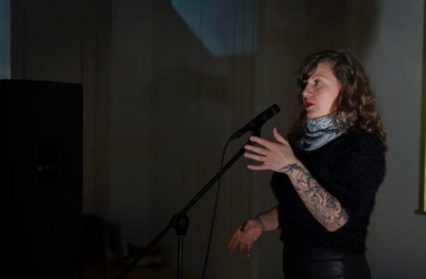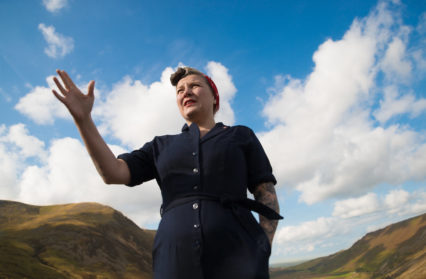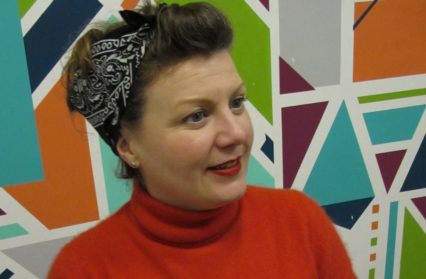Sophie McKeand presents her discussion titled The Politics of Authenticity as part of Wales Arts Review’s first Artists in Residence series. Throughout 2017 these artists, including Sophie McKeand will take a leading creative role in what Wales Arts Review publishes, centring their skills on a challenging project over the course of a month. We were inundated with applications, receiving hundreds of emails about the positions, and it was no easy task whittling down all that talent to this final eleven. Our team of six editors debated long into the night, and in the end, we decided on a collection of people who we most want to work with, and whose work excites us. We think you will be excited by them too.

What is the role of a poet in modern society? Wales’ Young Persons’ Laureate Sophie McKeand continues her exploration. This Politics of Authenticity piece by Sophie McKeand discusses what is the role of a poet in modern society. Sophie McKeand writes about the overwhelming challenge facing artists today: to speak up or stay silent about the politics of authenticity?
I’ve been thinking a lot lately about what it is to create and what it means to critique. This is probably because the first draft of a full-length poetry collection has gone off to my publisher and because I’m in the process of writing a review, but also because running poetry workshops for what feels like an age has sparked a time for intense reflection this autumn/winter.
Thinking back to the first days at university I’ve been remembering that, as a twenty-eight-year-old mature student, the most terrifying module was Literary Theory. That was twelve years ago so I’m not sure how much, if any, of it has been usefully retained, but the fragments of lectures that have been playing an insistent loop in the subconscious recently (until I’m finally forced to pay attention) are the early lectures on criticism.
Why am I remembering this now after all these years? More frustrating – why is the subconscious doing the equivalent of a pantomime look behind you! Every time I swing around nothing’s there and the day carries on regardless but still the chant behind you! behind you! rings louder between the ears so finally I have to write this piece in an attempt to address the incessant nagging and haul whatever it is out into the light.
One of the first things we learned about Literary Theory is that ‘back in the day’ you either knew if a piece of art was great or not. This understanding was an inherent part of the reader. It was the soul. The art spoke and the true soul knew how to listen. The next thing we learned is that this is total rubbish. It is not for the individual to decide on the merits of a piece, rather certain structures and rules can be applied to literature in order to offer a more objective criticism. There is no denying this explanation is ludicrously succinct but I hope it will suffice for the context of this piece.
Fast-forward to today and I’m reflecting on the methodology of running poetry workshops – what is it that I hope to achieve? What is it I hope participants will achieve? More importantly, what do they hope to achieve?
One of the elements I avoid in a workshop is offering criticism, which must appear perverse – why would someone come to a workshop if not to receive an opinion of their work? A poet I know well once said that my enthusiasm for what people have created was so great she could read out a bus ticket and I’d cheer her on. I’m not sure she meant it as a compliment but she’s right. And it is this point I keep returning to like déjà vu or a glitch in the matrix, so now I feel the need to pin it under this spotlight and dissect.
I’ve also been thinking a lot lately about automaton, especially concerning the behaviour of people. I have a friend who works in a factory and has done for years, and again I’m being reminded recently of a throwaway remark she made some time ago (but that I’ve heard elsewhere too) – that it’s so hard to return to work after the holidays she almost wishes there weren’t holidays. I’m going to let that sink in for a minute.

The final thread of this plait is something of a reoccurring theme for me – which is one of fashion. So much of what we accept as truth is just fashion. Nietzsche wrote more eloquently on this subject but when applied to criticism of poetry I’m forced to ask – how can I offer anything constructive? Many of the poets I admire: William Blake, PB Shelley or Dylan Thomas were not particularly highly regarded in their own time irrespective of the retrospective whitewash splashed about these days. Anne Waldman is one of the greatest beat poets you’ve probably never heard of, and that’s likely because she’s a woman who began writing in 1950s America – not a time or place known for its progressive attitudes to anything let alone female poets. Because the world around her wasn’t able to hear Waldman’s voice does that make her work any less valid?
Returning to workshops – if I’m not offering criticism, what am I offering? The answer to this is something that’s been a struggle to articulate for some time because it’s been hidden away. I know it exists – this is made apparent with every workshop but the vocalising has been some years in the shaping:
I want you, the workshop participant, to make up your own mind about what you find appealing – or not. The politics of authenticity relies on you and your outlook. The crafting is something I want you to figure through years of trial of authenticity and error. I’m happy to inject enthusiasm, instil a sense of confidence, shine some light on inspiration but after that, you’re on your own; the poem is entirely in your hands. As soon as I get involved it becomes a collaborative effort – there’s nothing wrong with that but, if you really want to dig into the depths of creation, it’s a path you have to walk alone. I’m not interested in putting my words into your mouth – I want you to find your own words and that is something I know from experience will take your entire life. My role, as far as I see it, is to get you started on the path. In fact, I prefer to signpost the beginnings of a number of paths throughout the course of the session(s). I want you to make ten-thousand mistakes. Publish some of them. Destroy work you later pine for because, with hindsight and time, you realise it was brilliant.
I’m loathed to have you finish the work during a session because I want you to go home and have something to work on. Being constantly shadowed, having every possible wrong turn highlighted encourages the creator to shy away from making perceived ‘errors’ instead of instilling a sense of confidence. It creates robots – automatons unable to think or act for themselves.
The image I have in mind springs from a memory of planting and replanting trees some years ago. At a year or two old, many trees look pretty similar, with few distinguishing features. Even the mighty oak begins life as a feeble-looking stick protruding from the ground like an over-confident weed. I can do one of two things – I can laugh at the hubris of that sticky-twig and tell her not bother wasting her time with dreams of greatness, or I can clear space, help with access to light and water, offer encouragement, and leave her to grow and learn and adapt to the elements. There is a third option of course, and that is to molly-coddle the tree. Transplant her into a hothouse, lop off certain branches, shape her beautiful and tame.
I know which one I prefer (option two just in case you were wondering).
I’ve found criticism of Shelley that read along the lines of – he’s clearly a genius but could do with an editor. When I’ve read this I’ve thought I’ve agreed because the words were written by men with letters after their name. But I realise now that’s nonsense. Perhaps he’s a genius because he didn’t have an editor because she chose exactly how he wanted the work to appear and to hell with anyone who tried to argue otherwise. It didn’t make him particularly popular in literary circles during his lifetime but his work has endured long after many of his contemporaries have wilted away.
There is much in poetry that is obtuse and awkward. Some poems feel closed, like a nut. I’m not sure it’s right that the poet has to also provide the correct nutcracker with each one. Perhaps only time can allow the nut to take root and shape, and by editing out what we don’t understand how we’re hacking away at our visionaries, our prophecies. I wonder what would have been lost from Blake’s work if he’d bowed to the fashion and criticism of the time.
Art is the very core of what it is to be human. Everybody has the capacity for creativity but our society is structured in such a way that only certain people access it. The politics of authenticity is an aspect of this. Perhaps this makes some artists feel special as if they have a gift or talent that others do not. Some will actively squash another if they feel their creativity is a threat. This only serves to devalue society as a whole – we are all uniquely gifted. When every member of a community is given the space and support to discover their true creative soul the whole of society benefits. But this is a long and circular path with myriad dead-ends, few perceived outcomes, and little reward because it has to be self-directed. An individual has to be allowed to walk miles in the wrong direction until they figure out how to get back on track. This method is the antithesis of automaton because people need to know, not because they’ve been told it, or because they’ve read it because they know in their soul what is true to their nature and what is a lie.
This is a nightmare for a lot of people to contemplate – especially some in politics and education – you can’t just leave people to do as they please, make their own decisions, walk their own path, that would be anarchy – all hell could break loose. It is so much easier to put people on railway tracks, in boxes, on shelves, in hothouses – to mould and shape and prune. It gives us a sense of control, but with this comes a great loss. People lose all sense of direction, of purpose and validity, they cannot distinguish between a lie and the truth; they’ll vote like automatons for policies and people who clearly don’t have their best interests at heart in the name of change just to have some sense of ownership over their lives. I’m reminded of a quote from the Tao Te Ching, ‘Trying to control the world? / I see you won’t succeed. / T’ien hsia shen ch’i / Those who control, fail. / Those who grasp, lose.’
To be creative is to be open, to take a gamble, to relinquish control, to risk ridicule and criticism, to be a sticky-looking-twig intent on rooting, on finding the strength to ignore calls from others who demand showy branches and height. Being creative is exactly what is needed to guide us to hear the beat of our own heart and follow it even when everybody else is running in the opposite direction. We need this way of thinking now more than ever – my only worry is that, because of the lengthy, open-ended nature of encouraging self-directed creativity, we have run out of time, and a forest fire rages nearer.
Part One of this Politics of Authenticity piece by Sophie McKeand is available too.
Part Three of this Politics of Authenticity piece by Sophie McKeand is also available.
This contribution, as well as the other parts to the Politics of Authenticity by Sophie McKeand, is part of the Artist in Residence series.











